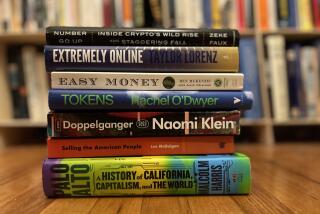Attacking the excesses and distortions of the Internet
If you throw enough stones, you are sure to break some windows.
That seems to be Andrew Keen’s strategy in his new book “The Internet Is Not the Answer,” published by Atlantic Monthly Press.
In his attempt to expose everything that is bad about the online world, he hurls a fair number of stones — and pretty indiscriminately. Plenty of glass ends up on the floor. By the end, you could think the Internet was responsible for most of the failings of the modern world.
This is a pity, because Keen’s latest attack on the excesses and distortions of the Internet — his third book on the subject — has a lot to recommend it. He can be a telling polemicist and has a sharp eye when it comes to skewering the pretensions and self-delusions of the new digital establishment.
As he announces at the start, Keen draws widely on published work for his account of the cultural, economic and social effects of the Internet’s growing influence. At times, this makes it feel as if he is recycling, undigested, every complaint he can find.
Keen’s approach is least effective for assessing the cultural impact of the Internet. There is, rightly, much hand-wringing over the worst manifestations of online behavior, such as the apparent ease with which some people spew hatred and prejudice online.
But to Keen, whose works include “The Cult of the Amateur,” there is nothing to redeem these failings. The tools of online collaboration and social media have brought an “epidemic of voyeurism and narcissism.”
Keen is more effective describing the imbalances in wealth created by the Internet and attacking the hypocrisy of tech entrepreneurs who hope to be seen as business heroes as they get rich by “disrupting” millions of jobs.
He is a Brit who took the start-up route after transplanting to Silicon Valley, but has made more of a name for himself as an author.
Keen has a sharp ear for the sanctimonious strand of tech happy talk. To him, the “sharing economy” is nothing of the sort, but a way for the new digital overlords to destroy stable jobs and circumvent regulation. And every Silicon Valley opportunist claims to be “democratizing” an industry when what they are really doing is trying to undercut the existing order for their own advantage.
He also points out the irony of privileged young men, some already paper billionaires, discussing how they “celebrate” failure, an attribute Silicon Valley insiders like to claim.
The huge concentration of wealth in the tech industry, and specifically in the San Francisco Bay Area, is a stark reminder of rising inequality.
The mistake of the online evangelists has been to assume that the Internet’s open, decentralized technology “naturally translates into a less hierarchical or unequal society,” Keen writes.
Instead, it has led to one of the biggest ever concentrations of corporate power — although it has yet to be seen how durable those new business empires will be.
So if the Internet is not the answer, what is?
Keen’s response: a new movement to match the one that countered the robber barons more than a century ago, with a wave of legislation and regulation to constrain the Internet giants.
There is, for now, little appetite for such action, at least in the U.S. — though the backlash that has started to build up over the last year, particularly in Europe, suggests that may be changing.
San Francisco-based Richard Waters is the West Coast editor of the Financial Times of London, in which this review first appeared.
More to Read
Inside the business of entertainment
The Wide Shot brings you news, analysis and insights on everything from streaming wars to production — and what it all means for the future.
You may occasionally receive promotional content from the Los Angeles Times.










